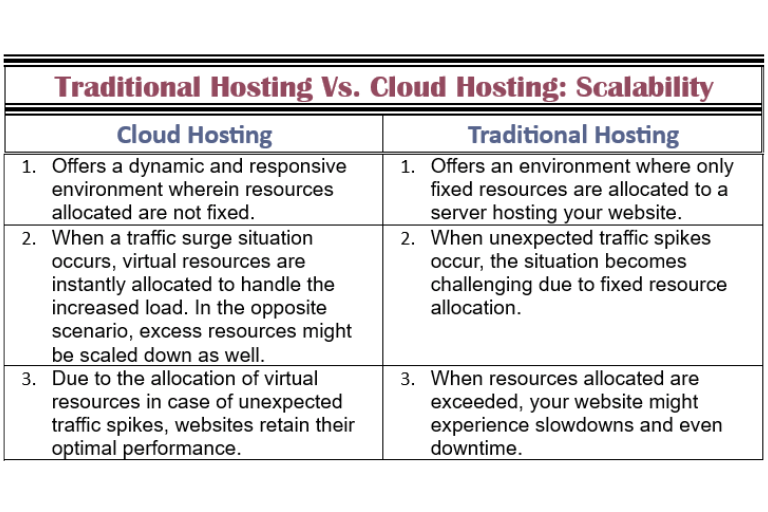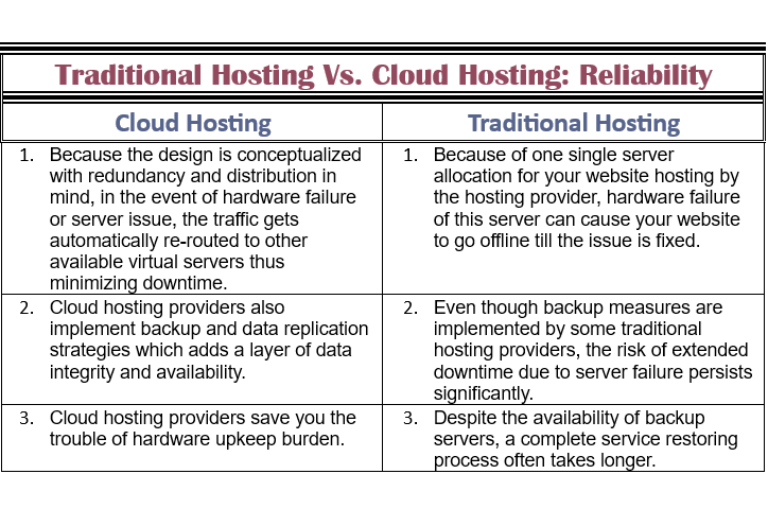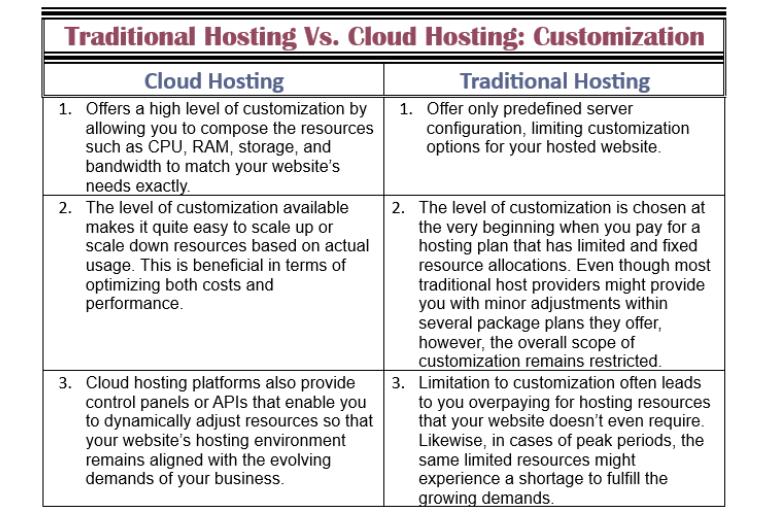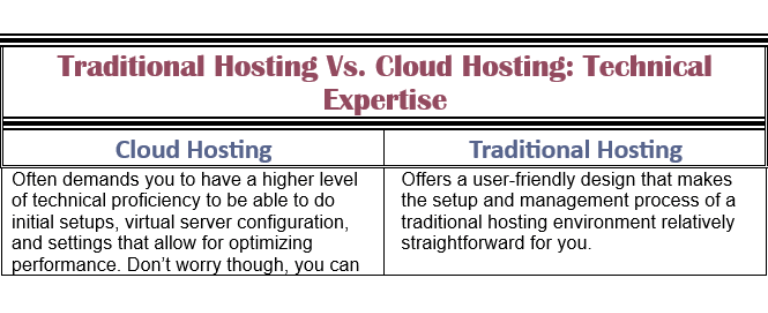This site contains affiliate links, view the disclosure for more information.
The term “Cloud” has been a trend for some time now, and it’s a trend that is here to stay in the long run.
And that is simply because cloud computing technology has helped many businesses, both big and small, to enhance their operational efficiency and better serve their customers.
How?
With a revolutionary approach to computing infrastructure via cloud computing comes cloud hosting that helps businesses transform the way they operate online. Rather than relying on traditional web hosting servers or on-premises servers, cloud hosting helps businesses leverage a network of remote servers that are hosted on the Internet to store, manage, and process data.
The innovative approach of transitioning the on-premises servers to remote servers brings in a host of benefits like unparalleled scalability, flexibility, as well as reliability.
Additionally, the self-handling of maintenance and management of the underlying infrastructure by cloud service providers saves businesses the trouble of hardware upkeep burden. This allows them to focus only on the core competencies of their business. Consequently, businesses get to optimize their operational efficiency, reduce underlying costs, and deliver seamless experiences to their customers.
Traditional hosting, on the other hand, hosts your website on a single fixed server which would be located in a specific data center. A server allocated to your website will be serving multiple websites and the resources available will be shared with all the websites being served within the same server. With the fixed number of resources allocated to each website being hosted, users of traditional hosting know what to expect in terms of performance.
For initial startup businesses and small websites, traditional hosting would do just fine, but when their network grows businesses start to experience performance issues with traditional hosting. More appropriately, it is the scalability issue that arises which affects and hinders businesses’ operation online.
This blog post intends to put forth the top 5 pain points your website or online business might suffer from if it is utilizing traditional hosting resources, side by side with how cloud hosting can help resolve them for a brighter and more efficient digital operation of your business in the future.
Table of Contents
ToggleA comparative Analysis between the Two Hosting types
Traditional Hosting Vs. Cloud Hosting - Scalability
With scalability being a pivotal factor for websites aiming to harbor varied levels of online traffic demand, here are the approaches taken by either type of hosting comparatively:

Traditional Hosting Vs. Cloud Hosting - Reliability
Unexpected downtime is yet another frustrating thing that often results in the loss of revenue for most businesses. Additionally, it affects the trust level of your site on both ends: your site users and search engines ranking your site. Here’s the approach taken by traditional and cloud hostings to ensure maximum uptime and minimal server failure risks comparatively.

Traditional Hosting Vs. Cloud Hosting - Customization
To tailor your hosting environment according to your needs, customization is necessary. It helps meet specific performance and resource requirements of websites.

Traditional Hosting Vs. Cloud Hosting - Cost Efficiency

Traditional Hosting Vs. Cloud Hosting - Technical Expertise

Cloud Hosting Model Edges over Traditional Hosting Model
A relative comparison between traditional hosting and cloud hosting shows that the cloud hosting model edges over the traditional hosting model for the following main reasons:
- Cloud hosting gives your website an increased server uptime – As discussed in a relative comparison section between the two types of hosting, cloud hosting does not allow any single point of server failure which results in maximum server uptime. Since your hosting’s server uptime directly affects your site’s performance, you can expect your site to perform optimally most of the time.
- Cloud hosting allows you to pay for only hosting resources that your website utilizes – You get to cut down on your site’s operating expenditure in cloud hosting by paying only for the hosting resources your site needs for optimal performance
- Cloud Hosting allows you to scale up or scale down your hosting resources depending on your website needs – The scalability of resources like RAM, bandwidth, storage, etc is quite easy in the cloud hosting model.
- Cloud Hosting offers an increased level of security for your website – Since the server hosting your site is not shared with other hosted websites in cloud hosting, it offers an increased level of security for your website. Additionally, cloud hosting infrastructure secures your data at multi-levels including data, network, application, and physical security.
- Cloud Hosting allows for the Independence of server location – Servers in cloud hosting are not confined to a fixed place. They are rather present across the globe and can be accessed simply via an internet connection from anywhere around the world.
- Cloud Hosting offers you a worry-free upgrade to the latest technology – With cloud hosting, you get to customize as well as integrate your own, latest software applications as per the needs of your business without worrying about first upgrading your server to the latest technology.
- Cloud Hosting allows a disaster recovery feature making you worry-free about arranging your site’s data backup yourself – Because cloud technology involves a multi-server setup, cloud hosting providers offer you a feature that helps recover your data in case of any unseen disaster. This feature is powered by automated data backup, usually carried out in an inter-connected server.
- Cloud hosting provides increased group and team collaboration – As is obvious from the name ‘cloud’, computing on the cloud server is available and accessible on the go anywhere across the world. Your team can multitask collaboratively on your website from anywhere, regardless of their geographical location, so long as they have a stable internet connection.
- Cloud Hosting eliminates the need to maintain in-house servers – This makes cloud hosting an environment-friendly option where no carbon emissions occur as is the case with physical servers in traditional hosting.
How Cloud Hosting has helped businesses evolve so far?
Many businesses out there have had their business skyrocket after transitioning to a cloud hosting model for their website. And no, the businesses being talked about here are not well-known brands alone. They rather include random successful businesses that operate in varying niches like online e-commerce stores, SaaS-providing companies, and even tech blogs.
Here are some thought-provoking examples of businesses that observed a significant increase in their business when they transitioned their websites to Cloudways – a cloud hosting services providing company.
- The founder of the tech blog SoftwareHow J.P. Zhang mentions that after switching their website to a cloud hosting model, they were able to save up a total of $300 per month on their website’s hosting costs. Read the full case study here.
- Luke Collymore director and solution specialist at Develo Design – an e-commerce Web Development & Magneto Agency -says that after wrestling to find the right hosting solution for 14 years, Cloudways finally dived in as a breath of fresh air and helped the agency overcome issues with performance and security by finally relieving them of shared hosting and dedicated servers which despite being powerful, were costly and complex to manage. Read the full case study here.
- Moving to Cloudways, a distinguished clothing brand named Ciyapa got its conversion rates up by 22%, page visits surged by 40% and increased page load time by 30%. Read the full case study here.
Transitioning to Cloud Hosting
While there are a number of tutorials available online that guide you step by step to making the transition from your traditional web hosting to cloud hosting platforms, Cloudways, one of the most reliable cloud hosting provider, offers you a simple migrator plugin that makes the entire migrating process a lot easier and simplified.
Here’s a complete step-by-step, short video tutorial guide to Migrating your WordPress site to Cloudways.
What does it mean when you say moving to the cloud?
No rocket science is involved here as moving to the cloud simply implies relocating your website data, applications, email, or software to a cloud hosting server which makes your data available from anywhere around the world.
For example, suppose you transfer the contents of your Microsoft Word file into a Google Docs file. In that case, you have transferred your document data file to Google Drive which is a cloud-based storage device, and can access that Google Doc file on any other device with a simple login to your Google Drive account regardless of your geolocation.
When is the right time to move from traditional web hosting to cloud hosting?
While it might be confusing to ascertain the exact right time for making this shift, below are 5 evident signs that are clear indicators of the need to make this shift.
- Your site gets unusual bumps in traffic patterns which might be because of seasonal demand for your product or service or other underlying factors that cause irregular traffic patterns on your site. In such a case, you should transition to cloud hosting because the said hosting model will offer you a more cost-effective solution to serve inconsistent traffic bumps without compromising on your site performance.
- Your site suffers from slow loading time or larger server downtime with traditional hosting providers, cloud hosting is what your website needs.
- Your business website grows significantly making it difficult to scale up with your existing traditional hosting provider. Cloud hosting provides easy scaling up of resources.
- Your website is mission-critical and can not cope with server downtime issues whatsoever. Cloud hosting offers high availability with its multiple servers that are located in different strategic locations.
- Your website stores sensitive user information and web security is your main concern which can never be compromised. Cloud hosting can help provide advanced security protection for your site data and prevent any unauthorized access.
Summing Up
The explanation above clearly shows that the cloud hosting model holds transformative potential in resolving the top pain points of traditional web hosting.
From scalability issues, reliability concerns, customization limitations, and cost inefficiencies, to technical challenges that are the most common pain points faced with traditional hosting, cloud hosting simply provides an innovative solution to all these pain points altogether.
By choosing to embrace cloud hosting, you can unlock unprecedented levels of operational efficiency, flexibility, and performance, ultimately enhancing your business’s ability to serve customers and achieve its digital objectives.
With the transitioning made simple through the WordPress migrator plugin by Cloudways, you can confidently navigate the evolving landscape of web hosting and position your website for sustained success in the long run simply because cloud hosting is positioned to meet the evolving digital trends.





Add a Comment